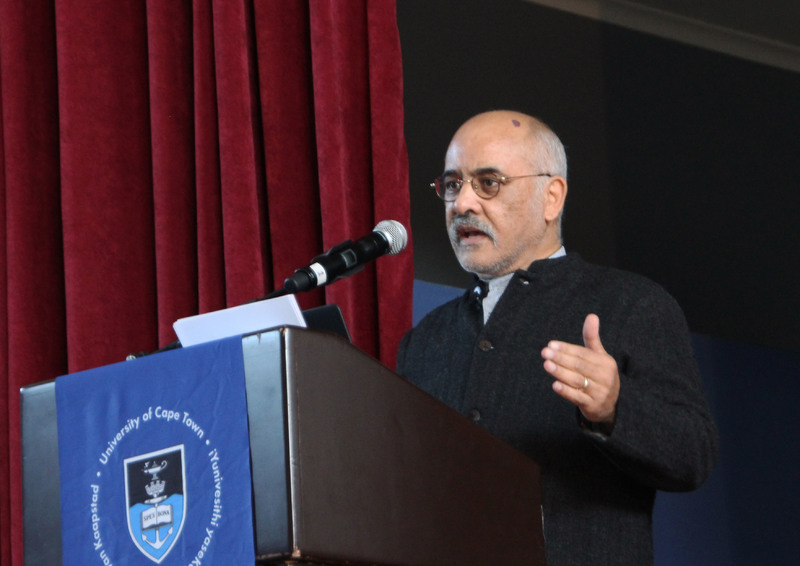Former DVC urges alumni to reflect on protests
05 June 2017 | Story Libo Msengana-Bam. Photo Supplied.
On Saturday, 20 May, UCT Emeritus Professor Crain Soudien addressed a packed audience of alumni at the Buck Road Primary School in Grassy Park.
This was the fourth instalment of the Distinguished Alumni Speaker Series in 2017, an initiative designed to profile extraordinary graduates of the University of Cape Town among the institution’s wider alumni community and public.
Professor Soudien is the chief executive officer of the Human Sciences Research Council and is a UCT alumnus, having obtained a number of qualifications from the university, including a Master’s in Comparative African Government and Law in 1979 as well as a postgraduate higher diploma in education in that same year.
He joined the university staff in 1988 and was later appointed as director of the School of Education. In 2009 he was appointed as deputy vice-chancellor, a position he held until his departure in 2015. He remains an emeritus professor in education and African studies at UCT. He has published widely in the areas of social difference, culture, education policy, comparative education, educational change, public history and popular culture.
His talk in Grassy Park, entitled: “What is the significance of the student protests for universities in the context of their transformation strategies?”, challenged the audience to re-examine their understanding of the national student protests, specifically the legitimacy of the issues raised by the students alongside the academy’s responsibility to transform.
One of the stark realities, he said, was that almost one-third of all South African students (African students in particular) who embark on a university education do not complete their first year of studies.
Given the low throughput rates, he posed several key questions to the audience, namely:
- What should the South African university be?
- Who should be admitted into it?
- Who should teach?
- What should be researched?
- What should be the responsibility of the university to its context?
Transitions in higher education
His talk offered two explanations for what has happened in South Africa over the past two years. The first: the radical changes and mergers that have occurred within our higher education system, post 1994, which were intended to remove apartheid from within it, resulted in the 26 academic institutions that are operating today and the removal of the divide between technical institutions and universities.
Citing the work of renowned higher-education scholar Professor Martin Trow, his second explanation is that South Africa’s higher education system is undergoing a process of “tipping over” from an elite system towards a mass-based system, from a Eurocentric model to one that seeks to empower.
Trow’s model, he said, was useful in helping us understand that what has happened in South Africa over the past two years has precedence in many other parts of the world and that these transitions (from elite to mass to universal) are often accompanied by periods of great turbulence. He said that this change or process of “massification” has an important but often ignored sociological context.
“Since 1994, something incredible has happened in South Africa and that has been the growth of the black middle class. From a base of around 350 000 in 1994 to anywhere between 4 and 14 million by 2014, this significant sociological shift has implications for universities also,” he said.
“In 1993 enrolments stood at 191 000, but between 1993 and 2013 these had increased by almost 261%. This, however, stands in stark contrast to the fact that the professoriate and academic teaching core are still largely white,” said Professor Soudien.
He reiterated that the university has an obligation to respond to these current realities and fluctuations.
On the issue of decoloniality, he made the point that the South African university was established on the basis of delegitimising other people’s understanding while validating all knowledge as it comes from Europe. He said that the decolonial project seeks to validate all knowledge, insight and wisdom and that “we need to bring back and legitimise all forms of knowledge which continue to occur in the everyday”.
Emeritus Professor Crain Soudien urges alumni to reflect on student protests.
Reaching out to a broader audience
The event was attended by more than 60 alumni, students and UCT staff members. Some guests, including UCT Executive Director for Finance Ashley Francis, who attended Buck Road Primary School as a child, expressed a deep connection to the site and to the community.
“The decision to host some of our Distinguished Alumni Speaker Series events in communities is part of an ongoing strategy to reach out to a much broader, more diverse audience of UCT alumni on topics that resonate with them,” said Libo Msengana-Bam, head of Alumni Relations at UCT.
“As one of the former ‘dumping grounds’ for non-white South Africans during apartheid rule, Grassy Park remains politically active. It is also home to many UCT students, staff and alumni and is therefore an ideal venue for a meaningful conversation about transformation,” said Msengana-Bam.
The University of Cape Town hosts a number of free networking events for alumni, featuring distinguished speakers. To ensure that you receive these invitations, make sure to update your details on the UCT website.
He is involved in a number of local, national and international social and cultural organisations and is the chairperson of the Independent Examinations Board, the former chairperson of the District Six Museum Foundation, a former president of the World Council of Comparative Education Societies and former chair of the ministerial committee on transformation in higher education. He is currently the chair of the ministerial committee to evaluate textbooks for discrimination. He is a fellow of several local and international academies and serves on the boards of a number of cultural, heritage, education and civil society structures.
 This work is licensed under a Creative Commons Attribution-NoDerivatives 4.0 International License.
This work is licensed under a Creative Commons Attribution-NoDerivatives 4.0 International License.
Please view the republishing articles page for more information.










